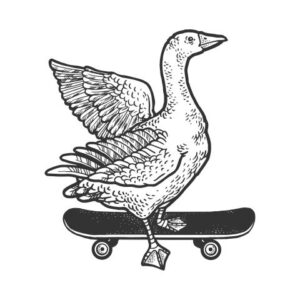Skateboarding has a notoriously anti-authority culture that makes it seem like it couldn’t be a competitive sport. This cultural perception really began in the 1990s as street skating took over as the most popular form of skateboarding.
However, there have been skateboarding competitions since the 1960s. The skateboarding community is still very divided over whether formal contests have a place in skateboarding. It is also important to understand that competition is just a small slice of skateboard culture.
Skateboarding has been a competitive sport since the advent of skateboarding. Competitive skateboarding began in the 1960s and took on new life in the 1970s which would lead to the formation of legendary skate crews such as the Bone Brigade. The X-games premiered in the 1990s and skateboarding has made its Olympic debut in July 2021.
The forms these competitions have taken have evolved massively over the years. Let’s take a look at exactly how skateboarding competitions have changed since the 60s.
Is Skateboarding a Sport?
Skateboarding require immense athleticism and technical ability to even ride a skateboard regardless of performing tricks. The boundaries that skateboarders have pushed in their own personal ability and the potential of riding a skateboard qualifies skateboarding as a sport much like rock climbing is a sport.
The introduction of skateboarding competitions also came along very early in the sport. Beginning in the 1960s, skateboarders could showcase their technical skills in organized skateboarding tournaments.
If you are interested in where to watch the top skateboarding movies for free, then check out our 2021 guide here.
Competitive Skateboarding in the 1960s
The 1960s skateboarding was still incredibly influenced by surfing and the tricks and competitions from this time reflected that. The early skaters almost seemed to dance on the skateboard much like some popular longboarders are doing today.
The only competitions were held locally and weren’t regulated by any organized body. The types of tricks riders used during this time would continue to be the popular way to ride skateboards until the Z-boys and the Bones Brigade in the 1970s radically changed skateboarding’s style.
Check out this advert from the 1960s introducing skateboarding as America’s newest sport.
Competitive Skateboarding in the 1970s and 1980s
In the 1970s the urethane wheel was introduced to skateboarding and revolutionized the sport. Whereas previously skateboards were dangerously unstable and limited in their speed and use, urethane wheels allowed skateboarding to boom as a new sport.
As a result, competitions began to evolve too. In the mid-1970s skateboarding competitions resembled those of the 1960s. Skaters mostly did flatground tricks that were heavily surfing-influenced. Acrobatic tricks such as balancing on own’s head or handstands on a skateboard were common.
However, with the formation of the Bones Brigade that was organized by an innovative Dogtown skateboarder and included extremely innovative young skaters such as Rodney Mullen, skateboarding competitions rapidly evolved. The ollie was invented and technical grabs and transition maneuvers soon followed.
Unfortunately, skateboarding’s popularity began to die down in the 1980s, yet some competitions persisted.
Competitive Skateboarding since the 1990s
ESPN created, hosted, and organized the first X games in 1995. This extreme sports competition was a slew of different sports that were outside of mainstream culture including skateboarding, dirt biking, BMX, windsurfing, climbing, and many other sports.
The X games quickly became skateboarding’s highest level of competition and awarded gold, silver, and bronze medals that became synonymous as skateboarding’s Olympic medals. How the prestige of the X games will evolve as skateboarding officially becomes an Olympic sport is unclear.
The X games have vert, park, and street skateboarding components and also introduced a real street component in 2010 meant to capture the street aspect of skate culture. The Olympics will have park and street skateboarding categories.
When Did Skateboarding Become a Sport?
Skateboarding is a sport, but doesn’t have the inherent head to head competitive nature of other sports such as basketball or football.
Skateboarding was a sport since the advent of skateboarding in the late 1940s and 1950s. However, competitions for skateboarding did not begin until the 1960s. Immediately after the invention of skateboarding, skaters would mimick complex surfing manuevers and tricks on their skateboards. The athletiscism and technical skill required to skateboard qualified skateboarding as a sport even before the ontoruction of organized competitions.
There of course, is a big difference in how you might cheer for or participate in football compared to skateboarding. Skateboarding doesn’t have this sense of direct competition when you skate in the street or in skateparks. It is often limited to a completely non-competitive performance with regards to other skateboarders. Like other sports, such as rockclimbing, skateboarders compete with themselves to learn new tricks, creatively navigate and obstacle, and surpass their previous abilities.
When Was the First Skateboarding Competition?
Skateboarding has been around since the 1950s or even the 1940s depending on who you ask. It took some time before skateboarding competitions began sprouting up.
The first skateboarding contests were held in the 1960s with the advent of the sport. There is dispute about the first skateboarding competition and this information is unknown. However, there is footage available of an international girls skateboarding contest from 1965 in Anaheim California. Around this time in 1963, Makaha also organized one of the first skateboarding exhibitions in Hermosa Beach California.
However, when you search that this on Wikipedia it cites 1973 which is simply incorrect. This is strange, but I’m not sure who to mention this to to change it. You can see footage from the 1965 contest on YouTube. This is first example of a broadcasted skate competition.
Is Skateboarding an Olympic Sport?
Some skaters are very excited and some are less so. Nevertheless, skateboarding has made it to the Olympics.
As of July 2021, skateboarding is an Olympic sport. The sport also has tentative approval for inclusion in the 2024 Paris Olympic games. The Olympic skateboarding competition will consist of two types; park and street. Nyjah Hudson is the highest-rated male street skater for the American Olympic team.
It seems that skateboarding is in the Olympics to stay. I’m personally a big supporter of this. Skateboarding culture is absolutely big enough to include the organized competitive aspect of the sport. The Olympics seems like a natural extension of this.
If you are interested about whether women or girls skate then check out our guide here.
Conclusion
So yes, skateboarding has a competitive sport aspect that has been around since skateboarding was invented. The style of skateboarding and the style of competitions have evolved massively over the years, however.
It is also important to note that skateboarding is not primarily a competitive sport. Most skaters will never compete in a competition and extremely famous skaters such as Rodney Mullen found solace in skateboarding as something different from sports. In reality, the competitive nature of skateboarding is simply a small subculture within the context of the overall culture.
That being said, competitive skaters are incredibly impressive and fun to watch. Skateboarders can even go to the Olympics now which is another evolution of what skateboarding has become.
Anyway, thanks for reading, and look out for more articles from Board and Wheels.


